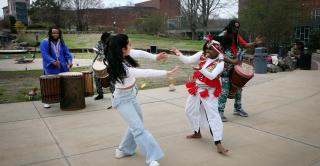
How do you quantify the power of the greater good? The Computer Science Department at Central Connecticut State University (Central) is working on it, boosted most recently by a $400,000 grant from the National Science Foundation.
The grant award will fund a project titled “Scaffolded Computing Projects for the Social Good,” which builds upon Central’s ongoing work with nonprofits and community organizations through its Software Engineering Studio. Students have created prototypes for a fully functional software system ready for use by the customer.
Since the studio’s inception in 2014, more than 100 teams of undergraduate and graduate students have completed nearly 60 unique projects for 42 clients—27 of which are non-profit or community organizations. In essence solving challenging, real-world software problems.
Recent clients include Sun, Moon, and Stars, which supports a community of families and children with autism; Journey Home, which provides support for people transitioning from homelessness; and Jobs for Humanity, which helps people with disabilities and other disadvantages find employment, among others.
“This grant recognizes the remarkable work our Computer Science faculty have been doing for years with our students and community partners,” Central President Zulma R. Toro says. “These projects are, and will continue to be, the inspiration of the scholarly work conducted by this university. The work we do with our communities improves the quality of life of our neighbors and partners, and it enriches our students’ educational experience.”
According to co-principal investigators and Computer Science faculty Dr. Stan Kurkovsky and Dr. Chad Williams note, the project will produce an adaptable curricular framework that can be used by other institutions to create and streamline service learning experiences in computing programs.
In their grant proposal Kurkovsky and Williams note, “To meet the increasing demand for well-qualified computing professionals, computing graduates must be ready to apply their knowledge and skills in a real-world environment.”
The work not only will provide students with exposure to teamwork in an authentic environment, it also will promote computing for the social good.
“This project aims to serve the national interest by increasing service-learning opportunities in computing programs,” Kurkovsky says. “By focusing on projects for nonprofits and community organizations, we aim to expose students to the impact of computing solutions on the betterment of their communities and improving the human condition.”
Central will share the NSF grant funds with Xavier University of Cincinnati, Ohio, which will work with the Central team to make the framework easier to adopt by other institutions. Xavier will receive approximately $110,000.



